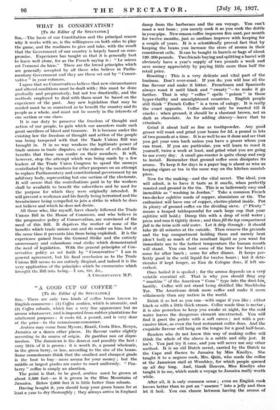WHAT IS CONSERVATISM?
[To the Editor of the SPECTATOR.]
Slit,—The basis of our Constitution and the principal reason why it works with us, is the willingness on both sides to play the game, and the readiness to give and take, with the result that the Government of our country is largely based on com- promise. Experience has taught us that it is generally best to leave well alone, for as the French saying is : " Le mieux est l'ennemi du hien." These are the broad principles which are generally accepted by all those who believe in Parlia- mentary Government and they are those set out by " Conser- vative " in your columns.
I agree that we Conservatives believe that new circumstances and altered conditions must be dealt with ; this must be done gradually and progressively, but not too drastically, and the methods employed to deal with them must be based on the experience of the past. Any new legislation that may be needed must be so conceived as to benefit the country and its people as a whole, and must not be merely in the interests of one section or one class.
It is our duty to preserve the freedom of thought and action of our people, to gain which our ancestors made such great sacrifices of blood and treasure. It is because under the existing law the freedom of thought and action of the people was being tampered with that the Trade Unions Bill was brought in. It in no way weakens the legitimate power of trade unions in trade disputes, or the redress of evils and the benefits that these can confer on their members. It will, however, stop the attempt which was being made by a few leaders of the Trade Union Congress to spend the moneys contributed by the members for other purposes on an attempt to replace Parliamentary and constitutional government by an arbitrary body, representing but one section of the electorate. It will secure that the contributions paid in by the workers shall be available to benefit the subscribers and be used for the purpose for which they were originally intended. It will prevent a workman and his family being terrorized and the breadwinner being compelled to join a strike in which he does not believe and which he does not desire.
All those who, like myself, have closely followed the Trade Unions Bill in the House of Commons, and who believe in the progressive policy of Conservatism, are convinced of the need of this Bill. It deprives the worker of none of the benefits which trade unions can and do confer on him, but at
the same time it prevents him from being exploited. It is the experience gained from the General Strike and the entirely unnecessary and calamitous coal strike which demonstrated the need of legislation. With the general principles of Con- servative policy as set forth by " Conservative " I am in general agreement, but his final conclusion as to the Trade Unions Bill seems to me entirely illogical, and indeed it is the very application of the principles which he enumerates which brought the Bill into being.—I am, Sir, &c., A CONSERVATIVE M.P.










































 Previous page
Previous page